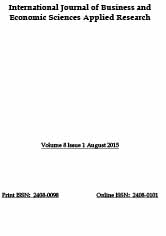The Interrelation among Faithful Representation (Reliability), Corruption and IFRS Adoption: An Empirical Investigation
The Interrelation among Faithful Representation (Reliability), Corruption and IFRS Adoption: An Empirical Investigation
Author(s): Alexios KythreotisSubject(s): Economy, National Economy, Public Finances
Published by: Τεχνολογικό Εκπαιδευτικό Ίδρυμα Ανατολικής Μακεδονίας και Θράκης
Keywords: IAS/IFRS Adoption; Faithful representation/reliability; Corruption; Conceptual framework
Summary/Abstract: Purpose – The degree of corruption, among other things, indicates the non-implementation of laws, weak enforcement of legal sanctions and the existence of non-transparent economic transactions. Therefore, the expected change in reliability (faithful-representation) resulting from the adoption of IAS/IFRS, does not depend solely on the adoption of IAS/IFRS but is also influenced by the degree of corruption in each country. The purpose of this paper is to examine whether the above statement is true. Design/methodology/approach – The data were taken from DataStream database and the sample period consists of listed companies of fifteen European countries that adopted IAS/IFRS mandatorily. The time horizon is 10 years, from 2000 until 2009. The period between 2000 and 2004 is defined as the period before the adoption, while the period between 2005 and 2009 is defined as the period after the adoption. The reliability/faithful representation of financial statements - as defined by the Conceptual Framework - is detected through regression analysis. Findings – The findings advocate that the adoption of IFRS/IAS seems to be not enough. It appears that the level of reliability of financial statements in every country does not depend solely on the adoption of IAS/IFRS but is also influenced by the degree of corruption in each country. Research limitations/implications – The models that are used for the measurement of reliability have as an independent variable the short-term accruals. Given that, the models fail to take into consideration accounting treatments that concern non-current assets/liabilities. Originality/value – The findings that are identified for counties with a high degree of corruption indicate a statistically significant reduction in reliability after the adoption of IAS/IFRS. These findings constitute a useful tool for the IASB and the European Commission as well as for the users of financial statements.
Journal: International Journal of Business and Economic Sciences Applied Research (IJBESAR)
- Issue Year: VIII/2015
- Issue No: 1
- Page Range: 25-50
- Page Count: 26
- Language: English

